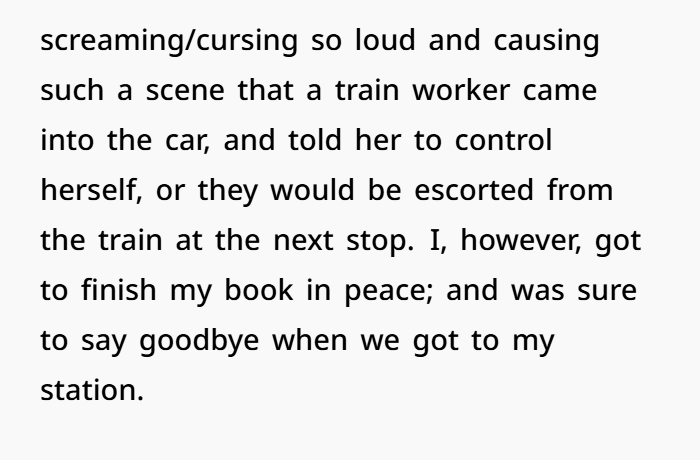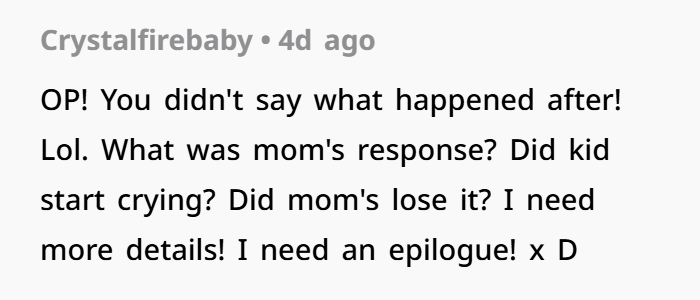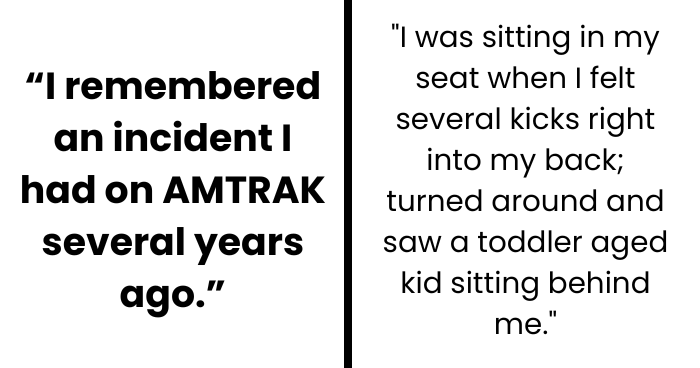Train Passenger’s Bold Move Silences Entitled Mom and Misbehaving Child: ‘Santa Claus Is Not Real
Reddit erupted in a debate after a passenger on an Amtrak train caused a stir with a controversial tale of how they disciplined a misbehaving kid and their parent They described how a constant series of kicks to the back of their seat from a small child, along with the mother’s cavalier attitude caused them to resort to drastic action: telling the kid that Santa wasn’t real.
At once, some were aghast and others delighted at this act, which sought to punish indirectly. As the kicks ceased, and the remainder of the ride went on without a hitch for the poster, the mother was in an uproar. The polarizing question will be: did the poster go too far, or right on target by destroying one of the most treasured beliefs of childhood?
Many of us often encounter frustrating passengers when traveling

But this woman refused to let a child and his mother get away with tormenting her during a train journey










The Ethical Dilemma of Intervening in Parenting
And it raises an important question: how far should you go to intervene in a public space, particularly when children are being rambunctious and parents seem oblivious? And public transport is a little microcosm, where patience, distance, and shared responsibility come together. In this case, the poster had gone through great lengths to establish their comfort zone only to find it uprooted time and again because their parents refused to discipline their siblings like many a child has likely been forced to experience.
The Rights of Passengers vs. Parental Accountability
Passengers can be expected to hope for at least a modicum of peace. Amtrak has a Code of Conduct that suggests travelers be aware of their environment and respectful of other travelers. The mother, by not responding to her child disrupting everyone else, arguably broke that social contract. According to a study published in the Journal of Transport & Health, disruptions — particularly during long trips — can lead to elevated stress levels and harm mental health.
In shared spaces, parental accountability is essential. If guided properly, children are adaptable, and they learn to behave according to the context easily, psychologists say. Here the child was ignored with a laugh by the mother, which is likely to encourage the behaviour. According to Parenting Science, inconsistency in punishment — or not administering punishment at all — can lead to confusion in children, increasing the chances that they may not change their behavior when socially appropriate.
Crossing Ethical Boundaries
That anger is completely justified in this situation, but attacking the belief in the child in Santa Claus seems a bit of a grey area in morality. The joy of Santa represents that childhood magic and the innocence of not knowing any better. Forcing a shutdown of that belief in a moment of frustration seems like a reach. Developmental Psychology Today states that believing in characters such as Santa encourages imaginative play and contributes to helping children develop reassuring stories about generosity and reward. Louise believes it would have an emotional impact on the child which would affect him long after the poster has left but she says that impact may not be immediate.
On a larger scale, this could also put more pressure on social expectations of shared caregiving in the community. The Ethics of Intervening in Parenting, the researchers argue while bystanders facilitate the socialization of children, their interventions will need to balance corrective behavior with the need to avoid overstepping their bounds. What the poster did is effective in stopping the immediate disruption, but in a manner that was not entirely parental (and the parenting in the oversight in the first place was poor).
Alternative Approaches to Addressing Disruption
If passengers become disruptive and it lasts for more than a minute or so, you can also ask the train conductor to intervene, experts say. By doing this, the role that was made the child in creating the issue is restored to parent or guardian and this further ensures proper discipline — without the potential for confrontation. Perhaps an alternative approach could have been to try to appeal to the mother more empathically, thus lessening her immediate defensiveness and increasing the likelihood of obtaining her cooperation.
The mother being called out, of course, did not handle her child the proper way, but the method in which the poster rectified the situation was, relevant to the story, rewarding; when viewed from the perspective of a parent, the method of teaching a child, suppressing their emotional growth, comes into question.
Readers shared mixed opinions on the story, and the author joined in on the conversation to provide more details







